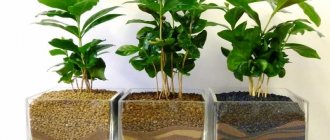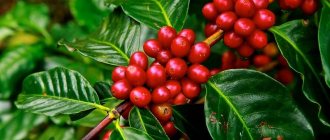Kenya is one of the African countries that exports high-quality elite coffees to different parts of the globe. Kenyan coffee is highly prized and considered one of the best in the world. Elite varieties have a rich, refined taste and excellent aroma. Coffee beans have these characteristics because craftsmen strictly monitor the growth and process of their production.
Coffee began to be grown in Kenya in the nineteenth century and still delights us with a wonderful, tasty product. Its production brings a lot of income to the country and is the main occupation of Kenyans. Kenya mainly grows Arabica beans, plantations of which grow at an altitude of more than a thousand meters above sea level. Every year there are two harvests of coffee beans, which consist of six harvests to obtain a quality product.
There are varieties of the variety that are distinguished by grain size. Kenya AA coffee refers to large grains, there are medium and small AB, B and others. Each coffee variety takes the name of the area where it is grown. The most exquisite product grows in Kilimanjaro and Meru, which has a strong taste and a light aroma of fruit. Kenyan varieties are distinguished by their pronounced sourness in taste, so they are sold mixed with others, which results in a very pleasant drink. But there is such a variety as Ruiruiru, it can be consumed in its pure form. It completely lacks sourness and is highly expensive, which is why it is sold together with other varieties.
Pibury Kenyan coffee, its medium-sized beans, is prized for its robust flavor and citrus aroma. Molinari is considered the best grain variety; it has small beans. The brewed thick drink has a fruity aroma and a delicate taste. All varieties of coffee from Kenya are endowed with citrus bouquets and a taste of wine, so they are in demand all over the world.
Story
Despite the proximity of Ethiopia, the first samples of coffee were brought to Kenya by European missionaries in 1893 (according to another version, the British around 1900). In 1963, the country emerged from British rule and organized the coffee industry in such a way that for more than 50 years it has been steadily developing, and Kenyan coffee enjoys a well-deserved reputation for being a top-class product.
The government immediately began to finance research, purchase modern equipment, develop and improve methods of collecting, processing, storing and roasting grain. At the same time, cooperative farms appeared, which later repeatedly proved their effectiveness. An auction system was introduced to sell local products. The last factor, apparently, determined the success of the industry.
At Kenyan coffee auctions, the lot goes to the buyer who offers the highest price; “internal” transactions at the established “price” are prohibited. Immediately before the auction, manufacturers send samples of their products to licensed exporters. They taste the aromatic drink themselves and selectively invite end consumers to a tasting. Based on their own assessment and the opinions of buyers, exporters place bids during the auction.
Thanks to this simple system, farmers are interested in improving the quality of their products, since their earnings directly depend on this.
Coffee recipe
Lovers of the coffee drink to improve digestion, appetite, and for colds offer coffee made from beans from Kenya, which includes red pepper. To do this, you need to prepare 2 teaspoons of any Kenyan beans, 100 grams of water, half a teaspoon of butter, a pinch of salt and red pepper, and the amount of sugar to taste.
Ground coffee beans should be poured into a Turk and fried over low heat. Then add water, sugar and bring to a boil. After this, add spices, oil, mix thoroughly and bring to a boil again. The prepared drink should be drunk in small sips from a preheated cup.
Kenyan coffee varieties
The most expensive variety is Kenya AA. These grains grow at an altitude of 2000 meters above sea level and are rightfully considered one of the best in the world.
Kenyan Arabica is represented by K7, Ruiru 11, Batian, SL-28, SL-34. The last two are a local specialty; they are artificially bred species that have the taste and properties of Arabica, but are less susceptible to temperature changes and diseases. In the wetter climates of the western part of the country, some Robusta grows.
Based on quality, local grains are divided into ten classes, from 10 (best) to 1 (worst). By size – categories E, PB, AA, AB, C, TT, T, MH/ML. Mostly AA coffee beans are imported, but AB and T samples are also found.
Ruiruiru Coffee
Ruiruiru bean coffee from Kenya is considered unique among gourmets. Its peculiarity is that the first sips seem sweet, and then a characteristic bitterness begins to be felt.
The taste of this type of coffee from Kenya depends on the heat treatment of the beans. The higher the roasting temperature, the more pronounced the cherry and chocolate flavors of the drink. Notably, Ruiruiru does not have a sour taste.
The popular Kenya AA Ruiruiru coffee variety grows on the southern slopes of Mount Kilimanjaro. This drink in its finished form has a bready taste. Often these roasted and ground beans are added to coffee blends to improve the taste.
A distinctive feature of the drink, which is brewed from beans of the Ruiruiru variety, is that the aroma of the drink changes over time. For example, you start drinking and it seems to you that the taste of the drink is sweet, there is a caramel aftertaste. But when you drink about half a cup of coffee, it will already taste bitter.
Production
Most coffee plantations in Kenya are located on the volcanic soils of the Mount Kenya plateau, at an altitude of 1400-2000 m. This allows the beans to be classified as SHG (Strictly High Grown). This type of coffee matures more slowly than its “lowland” counterparts, managing to gain maximum flavor and aroma.
Main coffee producing regions: Bungoma, Embu, Kisii, Achakos, Mt. Elgon, Nakuru, Taita Taveta, Tran-Nzoia, Ruiri, Thika, Kirinyaga, Mt. Kenya West, Nyeri, Kiambu, Muranga. The industry employs both small farms and large industrial production. The country's coffee industry employs approximately 6 million Kenyans. Cooperatives are responsible for roasting, grinding and selling coffee.
Kenya has ideal conditions for growing coffee trees: volcanic soils, a warm climate, moderate, even rainfall, and many convenient mountain sites - all this has become the key to the high quality of local products. Almost all grains are processed using the wet method - the pulp is peeled directly from the fresh fruit.
"Jardine" is a coffee from Kenya. Description of varieties and types
Jardine, which contains elite beans from coffee trees growing in Kenya, is considered a high-quality drink and one of the most popular among coffee fans.
This product is jointly produced by two and the Swiss Jardin Cafe Solution SA. As a result of a special production technology (double roasting of beans in a vacuum), “Jardin” retains the coffee smell and taste for a long time.
All packages indicate the strength of the drink in the form of numbers 3, 4 and 5. For lovers of a strong, rich taste, manufacturers recommend packaging with the number 4 or 5. The light aromatic drink is contained in packages with the number “3”.
Three varieties of this drink are considered the most popular. Jardin Dessert Cup coffee has a strong double roasting of beans (the number 5 on the pack) with a chocolate aroma. This variety is made from five types of Kenyan beans. Jardin All Day Long coffee has a medium roast (number 4).
For lovers of a soft drink, a package of Jardin Continental coffee with the number 3 is suitable. It contains a mixture of beans from two types of coffee trees, which are grown in Kenya and Colombia. Also popular is the Kenya Kilimanjaro Jardine Coffee.
Please note that the entire “Jardine” range is contained in hermetically sealed packaging. There are products presented in grains. Instant coffee “Jardine” from Kenya is also sold. Nowadays, many people prefer this type.
Cooperative production is a guarantor of quality
Most coffee in Kenya is grown by smallholder farmers
on small family plots and undergoes further processing and preparation for sale in cooperatives. Only a quarter of production is made up of large private farms with their own processing stations.
Typically, small farmers who own small plots of land hand over their harvested crops to the nearest processing stations. Before the processing process begins, the coffee cherries are carefully sorted. Only ripe red berries advance to the next stage. All work on farms and stations is done manually.
This approach guarantees stable product quality.
Famous Kenyan varieties
Traditionally, five different varieties of Arabica are grown in Kenya:
SL28 is one of the most famous and respected African Arabica varieties. From Kenya it spread further across the continent and into Latin America.
The SL28 variety has an interesting and long history. In 1931, researchers at Scott Agricultural Laboratories selected 42 coffee trees from different regions of Kenya and neighboring Tanganyika (present-day Tanzania) to study their yield and resistance to disease and drought. All trees were named with the prefix SL in honor of Scott Laboratories. The selection of the SL28 variety, descended from the Tanganyika Drought Resistant variety (Tanganyika Drought Resistant, the seeds of which were imported from Tanzania), gave very good results, after which the seeds began to be actively distributed among producers.
Some sources claim that Scott Laboratories crossed the French Mission, Mocha and Yemen Typica mutations to produce SL28. Whatever the exact genetic composition of this variety, their original goal was most likely to create a plant with good yield and resistance to drought and disease. Recent genetic tests have confirmed that SL28 belongs to the Bourbon genetic group.
Another distinctive feature of SL28 is the minimum required care for the plant. The tree can be left unattended for several years and then returned to successful production. In Kenya you can often find SL28 trees that are 60-80 years old and still bearing fruit.
The SL34 was also developed by Scott Laboratories in the early 1930s. The variety is of original Kenyan origin, all seeds of this accession were selected from one tree of the private farm Loresho Estate in Kebete, Kenya. Research records note that SL34 is derived from the French Mission variety.
French missionaries founded a mission in Bura (Taita Hills, Kenya) in 1893 and planted the first Bourbon coffee seeds, which they brought from Reunion Island. From there, the seedlings spread throughout the country.
Thanks to the active work of French missionaries and the fact that with their help coffee seeds were transferred from Reunion Island to content, the Bourbon variety received a second stable name - French Mission.
K7
was released in Kenya in 1936 after five generations of breeding SL28 and SL34. It is also characterized by low but stable productivity, high taste and aroma qualities, and, in addition, is resistant to some diseases of coffee leaves, for example, coffee “rust”. Belongs to the Bourbon genetic group.
Ruiru 11
– a high-yielding variety, resistant to disease, bred from several varieties: crossing Katimor with a hybrid of K7, SL28, N39 and Rume Sudan.
The variety owes its existence to the coffee berry disease epidemic in 1968, which led to the loss of 50% of the crop in Kenya. In the 1970s, the coffee research station in Ruiru, which gave the variety its name, began an intensive breeding program for varieties resistant to the disease. This led to the creation of Ruiru 11, released in 1985.
Batian
– an artificially bred mutation of the Ruiru 11 variety. A complex, multi-component variety. Inherits the genes of varieties SL28, SL34, Rume Sudan, N39, K7, SL4 and Timor Hybrid. Resistant to coffee rust and other diseases, developed at the Coffee Research Institute (CRI) in Ruiru in 2010.
History of coffee tree cultivation
Soon after the cultivation of coffee seedlings began, Arabica began to bear its first harvests. At the moment, growing, collecting and processing technologies in the African country are much more advanced than in Colombia or Ethiopia, where grains are still collected using the old-fashioned method.
The Kenya Coffee Council (KBC) purchases the entire volume, sorts and sells the raw material at the exchange, where an auction is held every week. There are more than 6 varieties, starting with the most elite and expensive, ending with second-class raw materials, which are used for the production of soluble analogues. Kenyan coffee beans account for 26% of the state's total exports.
Companies that engage in pre-sale preparation of raw materials:
- Malongo;
- Blues;
- Molinari Reserva;
- Safari coffee Kenya Kilimanjaro.
Varieties are usually distinguished by letter markings. "AAA" stands for the very best selected elite grade of coffee beans from Kenya.











